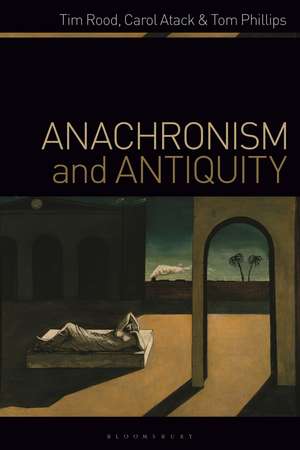Anachronism and Antiquity
Autor Dr Tim Rood, Carol Atack, Tom Phillipsen Limba Engleză Paperback – 5 feb 2020
| Toate formatele și edițiile | Preț | Express |
|---|---|---|
| Paperback (1) | 187.26 lei 6-8 săpt. | |
| Bloomsbury Publishing – 5 feb 2020 | 187.26 lei 6-8 săpt. | |
| Hardback (1) | 541.20 lei 6-8 săpt. | |
| Bloomsbury Publishing – 5 feb 2020 | 541.20 lei 6-8 săpt. |
Preț: 187.26 lei
Preț vechi: 216.43 lei
-13% Nou
Puncte Express: 281
Preț estimativ în valută:
35.83€ • 38.32$ • 29.88£
35.83€ • 38.32$ • 29.88£
Carte tipărită la comandă
Livrare economică 17 aprilie-01 mai
Preluare comenzi: 021 569.72.76
Specificații
ISBN-13: 9781350115200
ISBN-10: 1350115207
Pagini: 296
Ilustrații: 18 bw illus
Dimensiuni: 156 x 234 x 23 mm
Greutate: 0.45 kg
Editura: Bloomsbury Publishing
Colecția Bloomsbury Academic
Locul publicării:London, United Kingdom
ISBN-10: 1350115207
Pagini: 296
Ilustrații: 18 bw illus
Dimensiuni: 156 x 234 x 23 mm
Greutate: 0.45 kg
Editura: Bloomsbury Publishing
Colecția Bloomsbury Academic
Locul publicării:London, United Kingdom
Caracteristici
Stems from a high-profile international research project funded by the Leverhulme Foundation
Notă biografică
Tim Rood is Fellow and Tutor in Classics at St Hugh's College, University of Oxford, UK. He is the author of The Sea! The Sea! The Shout of the Ten Thousand in the Modern Imagination (Bloomsbury, 2004) and American Anabasis (Bloomsbury, 2010). Carol Atack is a Junior Research Fellow at St Hugh's College, University of Oxford, UK. She is the author of The Discourse of Kingship in Classical Greece (2019) and is an Associate Editor of Polis: The Journal for Ancient Greek Political Thought. Tom Phillips is Lecturer in Classics at the University of Manchester, UK. His publications include Pindar's Library: Performance Poetry and Material Texts (2016), and articles on Greek and Latin lyric poetry.
Cuprins
List of IllustrationsPrefaceList of AbbreviationsPrelude: Look to the End1. Inventing Anachronism2. Anachronistic Histories3. Anachronism and PhilologyInterlude 1: Dido versus Virgil4. Anachronism and Chronology5. Anachronistic Survivals6. Anachronism and ExemplarityInterlude 2: Ariadne on Naxos7. Anachronism Now: Multitemporal Moments Interlude 3: Aeneas in the Underworld8. Anachronistic DialoguesEpilogue: Crowning the VictorsNotesReferencesIndex
Recenzii
A riveting, unapologetically intelligent read . [The authors] display a thrilling sense of clarity, polymathy and rather exciting erudition, the interdisciplinarity of any true intellectual enterprise, all of which they share with true scholarly humility.
A provocative and stimulating book. It offers a comprehensive study of the history of anachronism, but it goes far beyond that to explore the ways in which the Greeks and Romans - and later generations which looked to classical antiquity for inspiration - engaged with different modalities of time. Employing both texts and images, and ranging from Homer to Borges, this book shows how anachronism is inevitably - and in many cases imaginatively - inseparable from our understanding and appreciation of past and present.
A comprehensive, intellectually ambitious exploration of anachronism, which enriches our understanding of how we configure 'antiquity' as a time period.
This is a very timely publication, filling an important gap by showing convincingly and with an astonishingly wide range of reading from Homer to the twenty-first century that anachronisms, far from being alien to antiquity, on the contrary offer valuable insights into the historical thought of classical times, and also into Greek and Roman art and literature.
A provocative and stimulating book. It offers a comprehensive study of the history of anachronism, but it goes far beyond that to explore the ways in which the Greeks and Romans - and later generations which looked to classical antiquity for inspiration - engaged with different modalities of time. Employing both texts and images, and ranging from Homer to Borges, this book shows how anachronism is inevitably - and in many cases imaginatively - inseparable from our understanding and appreciation of past and present.
A comprehensive, intellectually ambitious exploration of anachronism, which enriches our understanding of how we configure 'antiquity' as a time period.
This is a very timely publication, filling an important gap by showing convincingly and with an astonishingly wide range of reading from Homer to the twenty-first century that anachronisms, far from being alien to antiquity, on the contrary offer valuable insights into the historical thought of classical times, and also into Greek and Roman art and literature.
